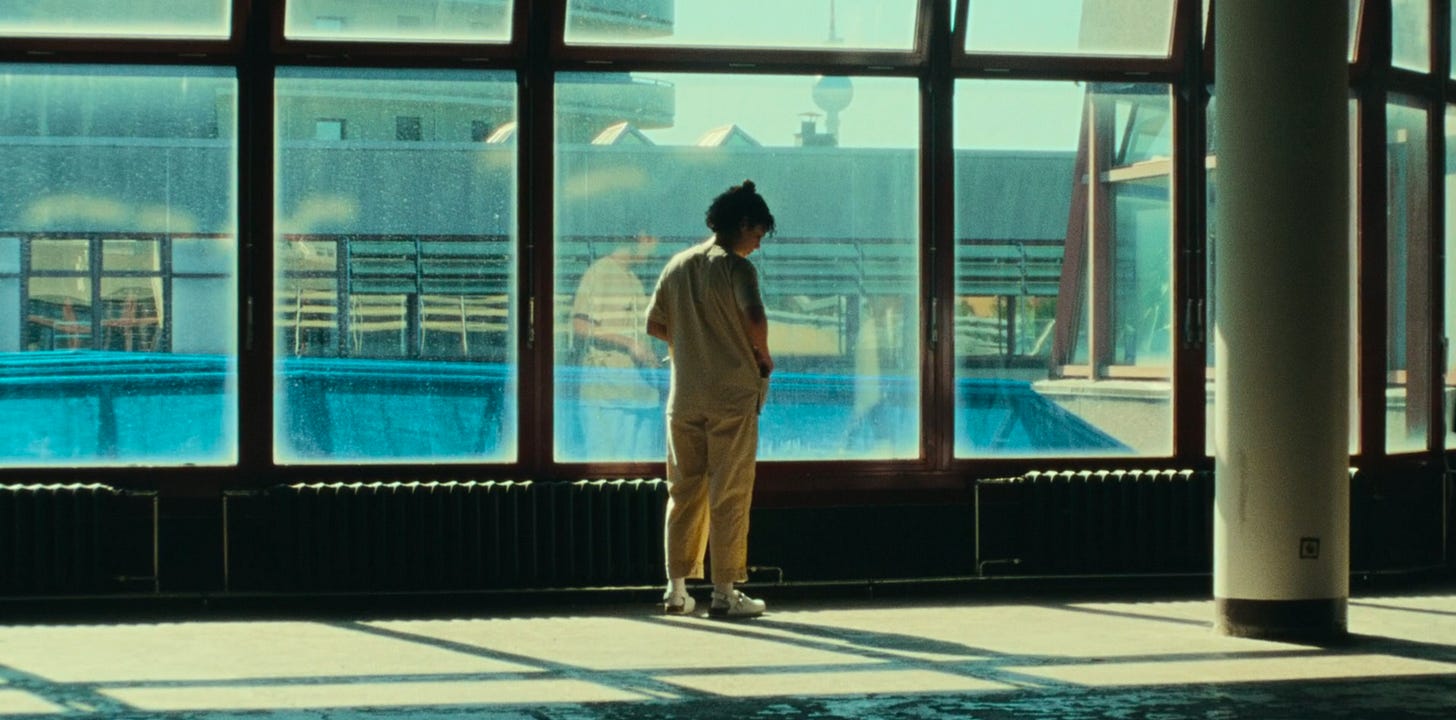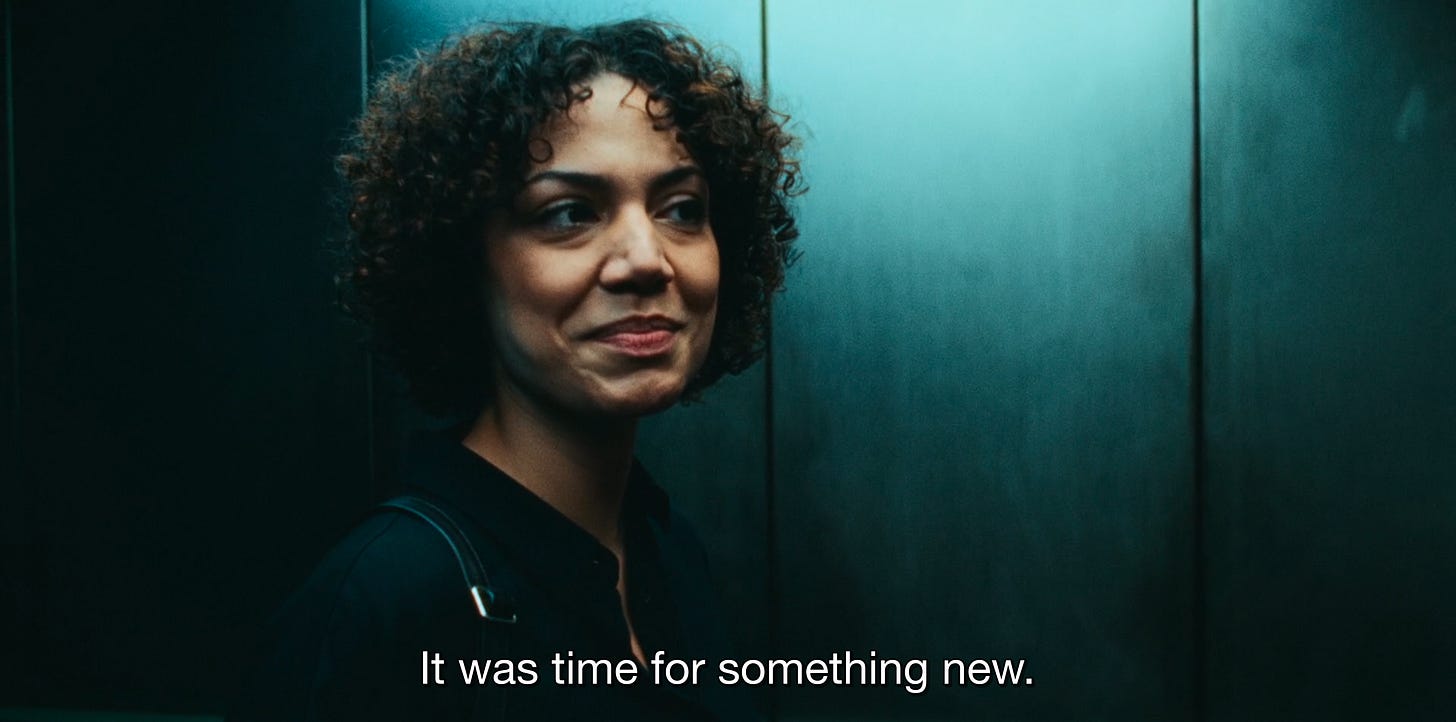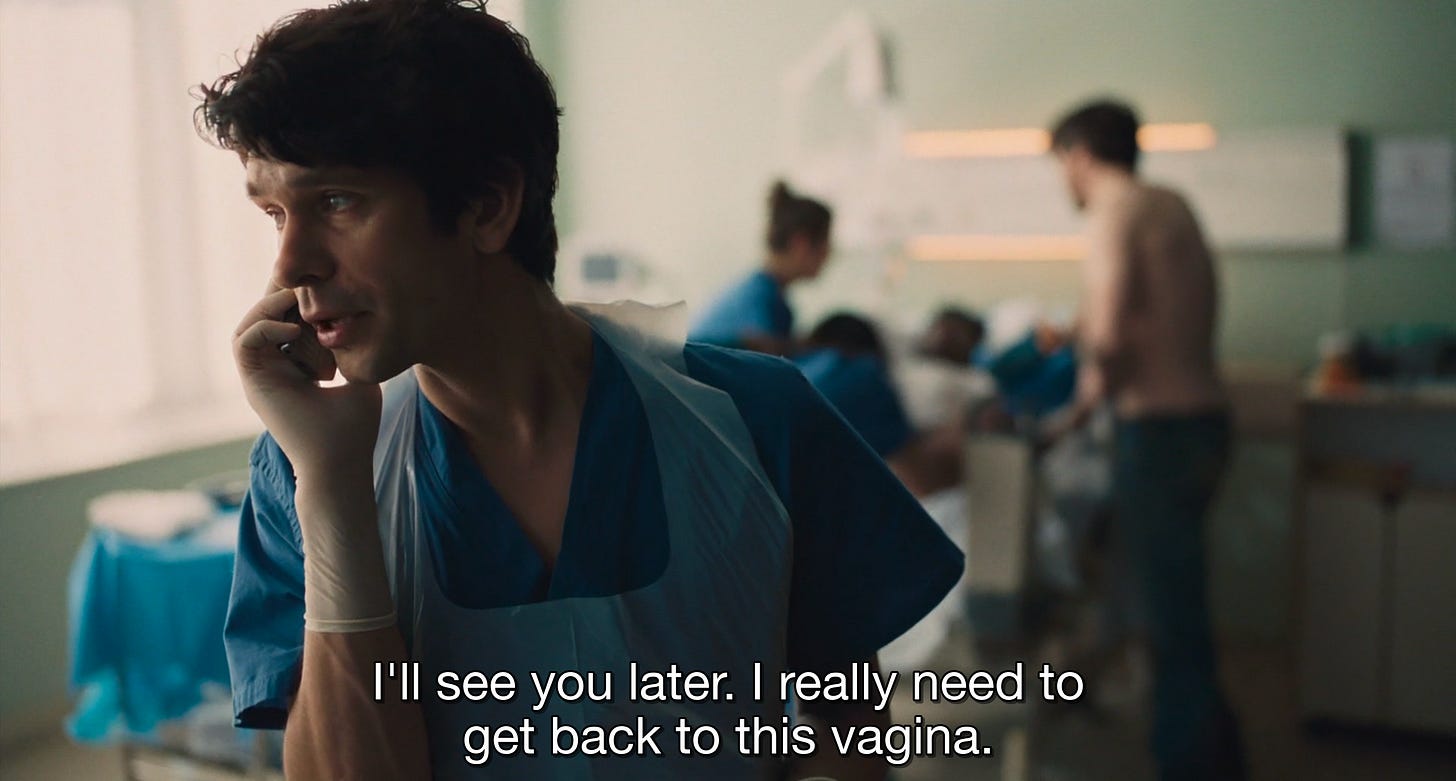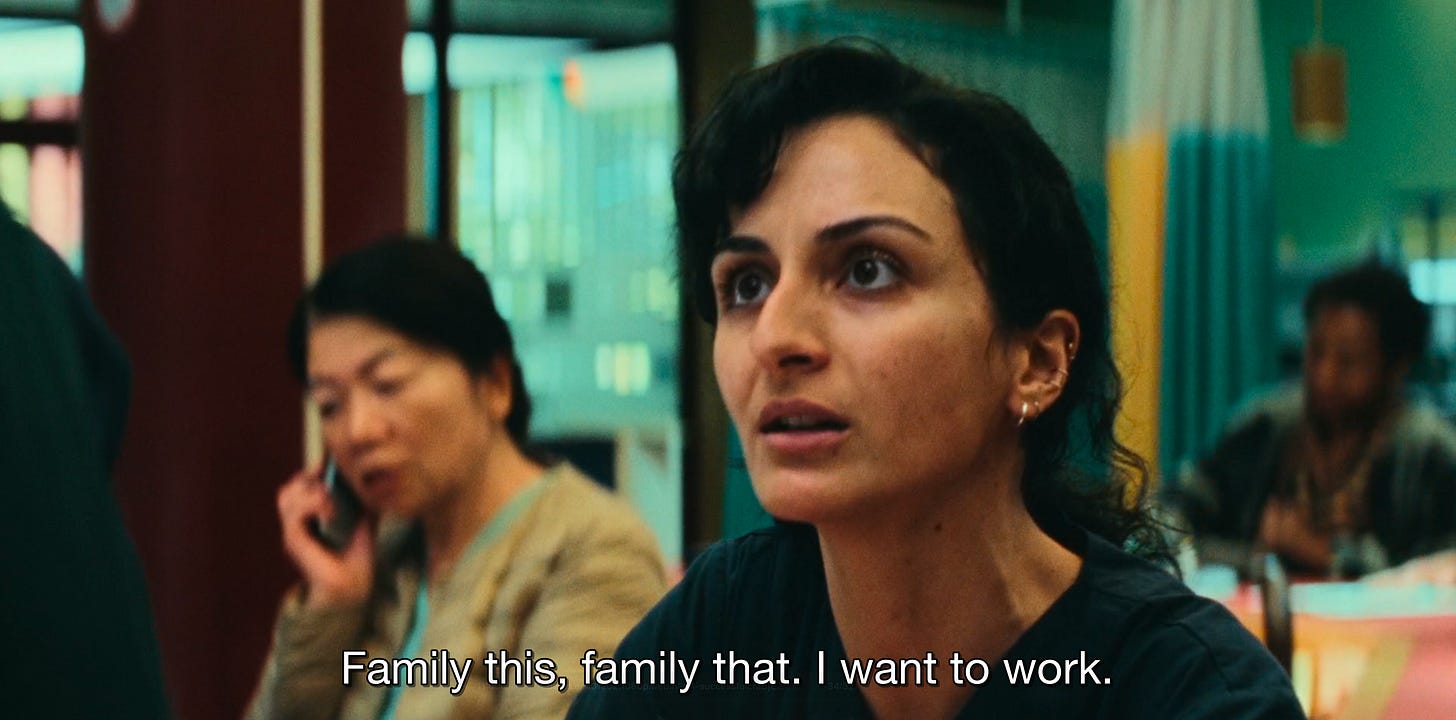Hometown television: A dispatch from Berlin
Finished The Pitt? Berlin ER is an even grittier hospital drama.
Occasionally, I commission guest essays on television for this newsletter. This month, Lina Heimann takes over the tv scholar newsletter to write about Berlin ER, a new German hospital show on Apple TV+ that got lost in the hype and shuffle of The Pitt. I love their essay and their reflection on specificity of place — this is a piece only someone from Berlin could write.
Lina Heimann (they/them) is a freelancer writer based in Berlin, Germany. They love television, especially unhinged female characters and are always on the verge of rewatching The Americans. Their work in English can be found in the (upcoming) collaborative newsletter Sorry No Title and sporadically in their Substack Gaywatch.
When Apple TV+ announced Berlin ER, a medical show set in an overcrowded ER in the Neukölln neighbourhood I was excited but also sceptical. Finally, a German production that isn’t a crime or spy show or a niche dramedy, or only available to German audiences. On the other hand, I worried that it was going to be yet another show set in Berlin that feels weirdly detached from the city and culture, especially because the head writer Samuel Jefferson is British, and the show is (I assume) made with an international audience in mind.
While watching this show I found myself getting sucked in by the drama. Berlin ER is a show that raises its stakes with every episode, problems that were only simmering in the pilot threaten to boil over in the finale and it probably works best as a week-to-week show instead of a binge, because it is a stressful watch. I liked the characters, the unique colour grading, the humour, and yes, I liked its depiction of Berlin. The thing is, Berlin ER is only tangentially about Berlin as most of the plot takes place within the ER, but there are many (sub)textual clues that communicate information about the city to the viewer. Even if this isn’t a show about Berlin, the city feels like a constant presence.
Berlin can seem rough and unapproachable, its inhabitants rude and impatient and it can be a difficult place to lay down roots – at least that’s what people who moved here have told me.
To me, it’s the opposite. Berlin feels integral to my identity, and I have an emotional attachment that is hard to pin down and at times unwarranted — I have lived here all my life, but I only know the city from my POV, there are neighbourhoods that I’ve never been to and entire subcultures that I will never have access to. Berlin is constantly in flux: neighbourhoods change through gentrification, people move here to study and then move away to start a family. As a friend recently pointed out, what is it exactly that we are attached to? Is it nostalgia? The familiarity with the architecture, the smells, the noise? Would we still have this craving for Berlin if our families and closest friends wouldn’t live here? Perhaps it is a feeling specifically shared by those of us who grew up in big cities, that at once fuels and drains us.
So when I watch a TV show set in Berlin, I want to see the good, the bad, the mundane and most importantly, I want it to feel like Berlin. The depiction doesn’t need to be accurate (though I do get annoyed by inaccurate distances) or even relate to my experiences, but it needs to ring true on an emotional level. Somehow, Berlin ER manages to do that, and I’ve been trying to figure out why.
A rough setting and staff that is unapproachable or downright hostile is also what Dr. Zanna Parker (Haley Louise Jones) is confronted with when she takes on the position of head of ER in an infamous hospital in Berlin Neukölln called “Krank”, which is short for “Krankenhaus (hospital) Neukölln” but also means “sick” in German (the German title for the show is also Krank Berlin). The hospital is in a so-called “problem neighbourhood”, the ER is understaffed, underfunded but often overcrowded and crucially, none of Zanna’s predecessors lasted long.
Zanna left a prestigious job in Munich for personal reasons and is seeking a new start in Berlin. She wants to improve the ER with innovative methods but is mostly met with scepticism or refusal by the doctors and nurses, who have established a (barely) functioning system amidst difficult circumstances. The two doctors mostly responsible for running the ER are Dr. Ben Weber (Slavko Popadic) and Dr. Emina Ertan (Şafak Şengül), who have stuck with their jobs despite the challenges and don’t see a point in opening up to newcomers who won’t stay. Ben is either working or clubbing and getting high — both in the club and at work. Emina has grown up close to the hospital, has a tough attitude and longs to leave the Krank for a better job because she’s ambitious, but also to distance herself from her family. Berlin ER only offers glimpses into the lives of these doctors, though. Even if we get to see part of their home or family lives, for the most part it’s up to the viewer’s interpretation to decide what these glimpses mean.
At its core, Berlin ER is a show about flawed people doing a flawed job. It is not the kind of medical show where doctors are the best in their field, have time to go above and beyond for patients and are surrounded by state-of-the-art technology. Instead, there is an episode where the computer system shuts down and everything needs to be done by paper. Apart from the genre, the only similarity between a show like Grey’s Anatomy and Berlin ER is that in both shows members of staff have sex in a storage room and inappropriate workplace romances bloom. A more fitting comparison is a show like This Is Going Hurt, which relies on realism and where doctors try their best but make mistakes, while working in a system that limits their abilities (both shows are also based on the writers’ experiences of working in the NHS).
Berlin ER leans into clichés about Berlin in general and about Kreuzberg and Neukölln in particular: everything is messy and dirty, there are patients high on drugs, a drag queen and queer party-goers and gang-related violence. And while the way these themes come together feels heightened, it doesn’t feel derogatory and the show chooses to criticise institutional issues like racist police violence, access to medical help for undocumented people and the privatisation of healthcare. After all, a public hospital is often a place where people come together who otherwise don’t interact. This feels especially true for neighbourhoods that have undergone drastic changes due to gentrification. For context: These are neighbourhoods in formerly West-Berlin, where historically many immigrants and particularly the so-called Turkish “guest workers” lived as well as students and leftist squatters. For a long time, the neighbourhoods weren’t considered hip and were often named in racist headlines but are now tourist destinations, full of cool bars and coffee shops and rents have increased drastically.
Watching this show, I particularly enjoyed small details that aren’t necessary to understand the plot but offer fun meta commentary. There is for example the fact that Zanna left a job in Munich: Munich is posh, clean and conservative, whereas Berlin was once called “poor but sexy” by a former mayor. In short, Berliners don’t like Munich and vice-versa, and though it is never made explicit, it would make sense if the staff of the ER view her as an outsider on multiple levels. Another such detail is that when the paramedics Olaf (Bernhard Schütz) and Olivia (Samirah Breuer) are called to a Drag bar, Olaf knows one of the queens, because her father and Olaf knew each other through the house squatting scene when they were young. Olaf reminds me of a specific type of Berliner, who has a leftist past, has lived in the same area for 30+ years (if gentrification hasn’t forced him to relocate) but whose language and politics aren’t necessarily in line with a younger generation — which is exactly what Olivia, who is young and new to the job, takes issue with. Their relationship is one of my favourites of the show, because while it’s a classic generational conflict the depiction is also nuanced, and they both surprise each other.
In general, the characters and their relationships are what I enjoyed the most about this show. Not just the ways they interact but also how they speak, because one of my ongoing complaints about German TV shows is about the use of language. Dialogues are often theatrical and too formal; no one talks like that in real life and because of it I find it hard to relate to the characters, especially because they are supposed to represent something I’m intimately familiar with. In Berlin ER the characters speak like actual humans, and I root for them, even if their actions are at times disastrous or they act rude. I always have a soft spot for characters like Emina, who put on a hard exterior and push people away but shockingly, I was also invested in some of the straight male characters, even if they are moderately (Olaf) to extremely (Ben) flawed. The characters in Berlin ER aren’t necessarily easy to like on first impressions, but there is a sincerity to them that feels like Berlin, regardless of whether the characters are supposed to be from Berlin or not. I live within a 15 min vicinity of some of the shooting locations and I can place some of these characters in my day-to-day life. To me, that is more important than whether the ER here is really that chaotic.
Television does not need to be accurate, but when the aim is to portray a specific context, it needs to feel true. What I mean by that is this: I certainly hope that when I go to the ER, the doctor treating me isn’t high on painkillers — but it doesn’t feel impossible that doctors working in a broken system might be addicted to painkillers or choose other unhealthy coping mechanisms. Berlin ER is neither an accurate portrayal of an ER nor of Berlin, but it is compelling television and at its core rooted in something real. And it certainly doesn’t hurt that it's also casually queer.










Yes, craving more medical shows after watching ER for the _th time, indulging in The Pitt, barely making it through Pulse on Netflix, and loving Respira (also on Netflix via Spain), I stumbled upon Krank Berlin and absolutely fell in love with the pilot. It was intense AF and may try it again on a week to week basis like you suggested. Too, like you said, the cinematography and color grading is cool to watch! I’ve never seen that before. Just wish we could make a modern medical show for the US that isn’t so dry as Pitt but feels chaotic and true to life unlike counterparts Greys and Pulse. Thanks for writing this piece!
What a wonderful and thoughtful piece!! Love this show and your reflections on it 🩷